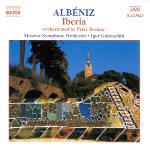I don’t know exactly who Peter Breiner is, but he has no business touching Albeniz’s masterpiece. There’s a fine “complete” orchestral version on Telarc that consists of the standard Arbos suite with the remainder colorfully arranged by Carlos Surinach. Breiner quite simply hasn’t any feeling for this music’s sensuality, poetry, or color. Nor, for that matter, does the Moscow Symphony. The opening “Evocación” immediately establishes the dull, monochromatic sonic framework: unimaginative accompaniments in the strings, over which an English horn quacks like a dyspeptic duck. By the time the music reaches No. 3, “El Corpus en Sevilla”, with it’s Prokofiev-like woodblock and xylophone parts, it’s abundantly clear just how badly Breiner’s bony, linear, hard-edged conception of this impressionist masterpiece sits with what Albeniz actually wrote. To paraphrase (very loosely) Bernard Shaw: Here is a piece that would have taxed the orchestrating skills of a Ravel, a Mahler, a Strauss, a Falla; but what we have here is not Ravel, not Mahler, not Strauss–not even Falla, but just Breiner. In fact, passing on this one’s a no-Breiner.
































